

Keywords: ORIGINS OF PAREMIOGRAPHY ; PAREMIOLOGY
Regarding proverbs there was highlighted interest since the antient times. Their presence in different cultures of global civilization is evident. Since the fifteenth century the interest on proverbs is emphasized, when it is also separated as a particular field called paremiography and paremiology, which implicates collection, evidence and the study of proverbs. In sixteenth and seventeenth century the interest for this field increases distinctly. Exactly in this time, in 1635 our writer and lexicographer Frang Bardhi, in his dictionary “Dictionarium Latino- Epirotikum” dedicates a particular chapter the edition of proverbs or as he calls them Albanian proverbs. As much it is of particular relevance the registration of these proverbs as a testimony of the beginning of our paremiography, the same relevant are the studies following as a testimony of paremiological approach to these oral compositions in Albanian folkloristic in general. The paper aims a chronological review of this ancient genre of oral creativity from their registration to their study.
More...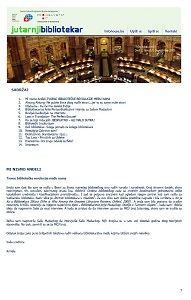

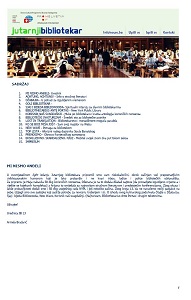
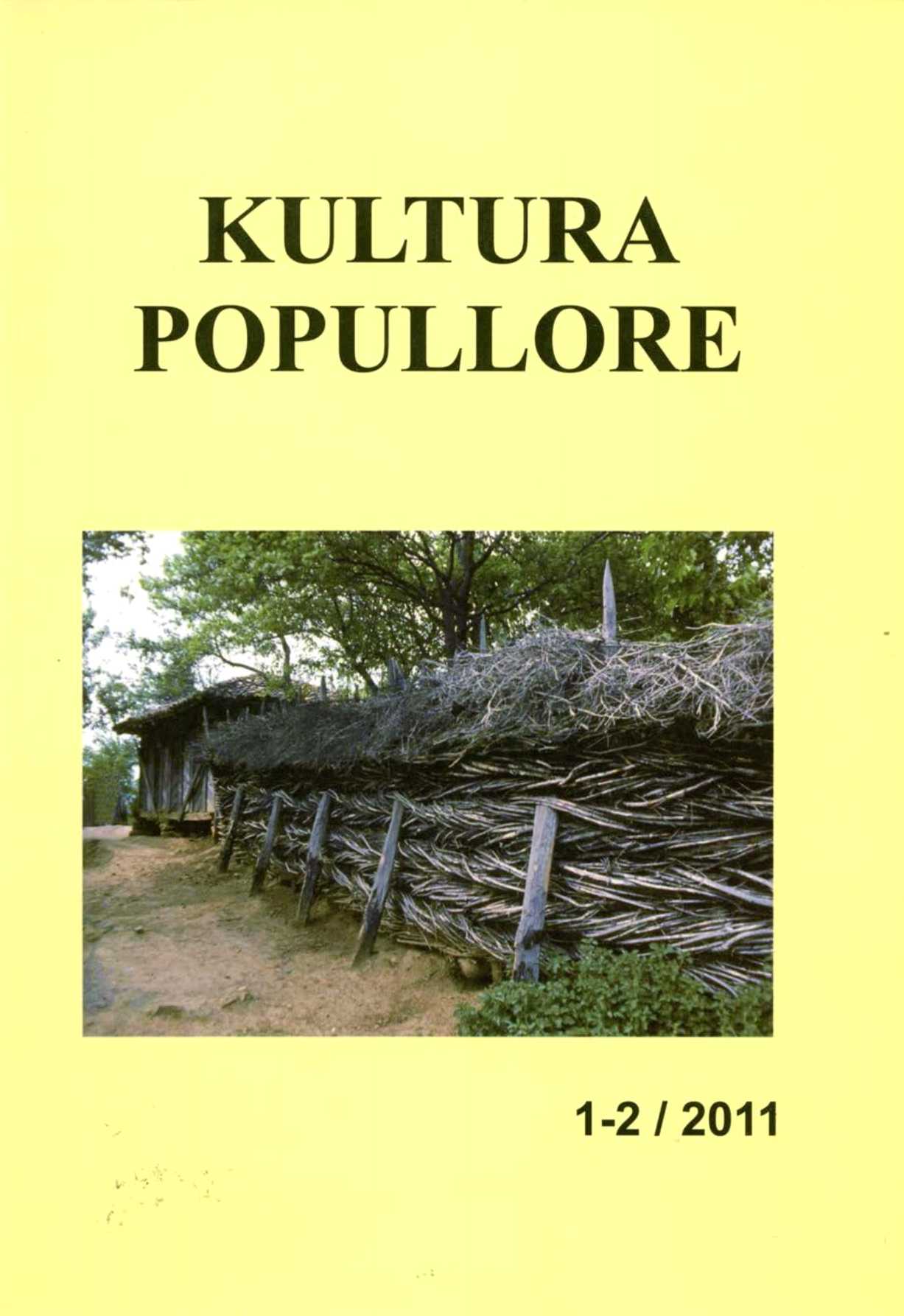
Keywords: KeTI HARITO ; FOLKLORISTE E RADHËVE TË PARA
Realizimi i një teksti të historisë së folkloristikës shqiptare është nevojë e domosdoshme në ditët e sotme, pasi realisht tashmë vonesa është bërë e ndjeshme, për të nxjerrë në pah në mënyrë të përgjithësuar, jo vetëm ndihmesën e atyre mbledhësve që deri më sot janë bërë objekt trajtesash të ndryshme, por edhe për të sjellë figura të tjera të nderuara, që në një farë mënyre janë lënë në harresë, apo mund të jetë bërë thjesht një përmendje e tyre. Gjithmonë ka ekzistuar dëshira që brenda mundësive, të jepet më e plotë dhe sa më realiste rruga nëpër të cilën është ecur prej tyre, për të ndërtuar kështu edhe të ardhmen e punës së folkloristikës shqiptare. Duke marrë përsipër hartimin e një historie të tillë, veprimtari si kjo e sotmja nxit dhe sjell ndihmesa të rëndësishme për ndriçimin e historisë së folkloristikës shqiptare.
More...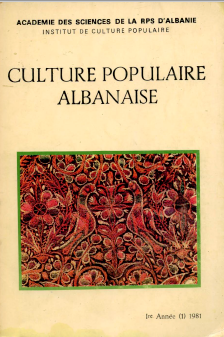
Keywords: Albanian folk Music;
The folkloric creativity of the Anti-Fascist Struggle of National Liberation and the period of socialist construction took part in a large number of private individuals. Several rhapsodes, musicians and popular dancers have become known (although many others have remained anonymous). They gave a valuable contribution, each of them to the extent of his talent and each in his own field, to enrich the Albanian folklore. Their number has always increased, which, naturally, is in relation with the rich life of our times, which does not fail to give leaven and verve to inspiration, to which is added the solicitude of shows the whole society for folklore, considered one of the bases of development and consolidation of our new national socialist culture.
More...
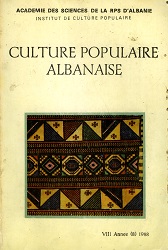
Keywords: bibliography; folklore; ethnography;
More...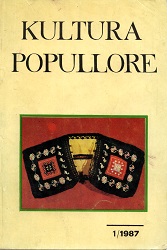
Keywords: Albanian; proverbs; national character;
Folkloristëve, sidomos, paremiologëve, prej kohësh u ka tërhequr vëmendjen mendimi i Bekonit se «Proverbat janë pasqyrë e gjenisjë, e jetës dhe e shpirtit të një kombi». Mirëpo, që në hapat e para të punës praktike studimore të prirë nga ky mendim, doli një vështirësi: u vu re se mjaft proverba funksionojnë si vlera shpirtërore jo të një, por të disa popujve, madje, ndonjëherë, pothuajse të të gjithëve.
More...
Keywords: Albania; culture; folklore; ballads;
Diskutimi që po vazhdon në faqet e revistës «Kultura populiore» kushtuar problemeve më themelore të baladës shqiptare, është me interes shkencor dhe ndihmon për të njohur më mirë e për ta përhapur këtë gjini poetike me tiparet e saj dalluese dhe me ngarkesë emocionale të ndjeshme. Një diskutim i tillë zgjon interesin e specialistëve, të lexuesit dhe të poetëve, duke hedhur dritë në disa pamje estetike, historiko-folklorike si edhe të lidhura me poetikën e gjinisë së baladës.
More...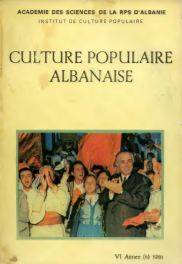
Keywords: Albania; folklore; Party; Enver Hoxha;
«C’ést dans la saumure que notre peuple a trempé son pain dans le passé - a dit le camarade Enver Hoxha - mais il a si miraculeusement gravé son assiette en bois. Le sentiment fin esthétique et son goût artistique se sont faits remarquer partout dans les merveilleuses rhapsodies, dans les costumes fantastiques, dans les danses miraculeuses. .. Le génie artistique de notre peuple se voit partout où l’on jette le regard, partout où l’on pose la main». Par ces mots qui brillent de la fierté et de l’affection profonde pour le peuple, notre dirigeant inoubliable met en évidence la vitalité du génie créateur artistique collectif.
More...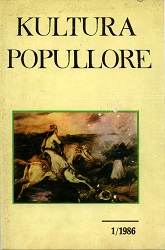
Keywords: bibliography; Albania; folklore; ethnography; 1984; publications;
More...
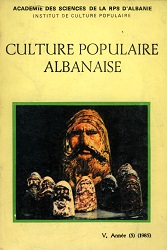
Keywords: Albania; epic; folk prose;
L’étude de notre épopée, exige uné concentration encore plus grande de l’attention sur l’espace folklorique albanais, afin de découvrir des liens de cette épopée avec lés autres genres de notre folklore. Ainsi, là question des liens de l’épopée héroïque légendaire avec notre prose, avec le conte fantastique et surtout la légende, en tant que formes anciennes du récit populaire, prend une importance particulière.
More...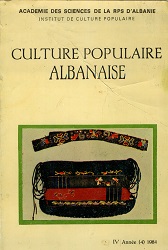
Keywords: Albania; epic; ballad; history; historical reality;
La ballade populaire albanaise, de par sa forme artistique et son contenu, sa nature en changement et évolution permanents, sa perspicacité et son élasticité a pu établir des rapports avec la réalité des diverses époques historiques, s’est montrée digne et capable à se conformer aux goûts, exigences et aux besoins idéoesthétiques de ces époques. Cela veut dire que l’on peut parler de rapports entre la ballade et la réalité historique, de son aptitude à apporter, outre les autres formes de l’information, une information historique également.
More...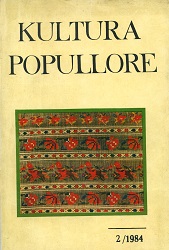
Keywords: bibliography; Albania; ethnography; folklore; 1983;
More...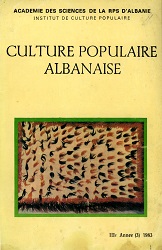
Keywords: Albania; proverbs; sayings; truth;
L’histoire de la création et de la vie artistique des proverbes populaires albanais nous convainc de l’effort populaire soutenu pour découvrir, par leur intermédiaire, la vérité, rendre du domaine commun des opinions et des appréciations aussi exactes et complètes que possible. Cela est en rapports intrinsèques avec la fonction sociale particulière des proverbes, avec leur objectif permanent de transmission de l’expérience aux masses, préparer l’homme du commun pour la vie, lui apprendre et le conduire dans son comportement, son activité, son effort en tant que citoyen et membre d’une collectivité donnée, d’une société donnée. Il va sans dire qu’il s’agit là d’un dessein pour tout genre ou forme artistique populaire, pour toute création folklorique: tout le folklore est, entre autres, un enregistrement direct de l’expérience populaire et un admirable moyen original de communications entre les générations. Pourtant, l’élément cognitif est plus apparent dans les proverbes. On pourrait même dire que cet élément y prédomine.
More...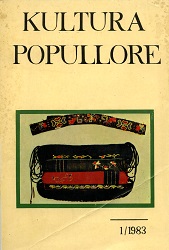
Keywords: Albania; Shkodër District; culture; ethnography; tradition; folklore; 1982; folk costumes; College of Saint-Adrian;
1. Mbi veprimtarinë kerkimore-shkencore te institutit te kultures popullore gjate vitit 1982; 2. Rreth veprimtarise së berthames shkencore të kulturës popullorenë shkodër gjatë vitit 1982; 3. Sesion shkencor kushtuar 250-vjetorit te themelimit të kolegjit arbëresh të shën-adrianit; 4. Takim me lexuesit; 5. Ekspozita «Veshje popullore të rrethit të Tiranës»; 6. Sesion shkencor mbi kulturën popullore të zones se shpatit; 7. Revistës «iliria» i jepet medalja e artë nga akademia nderkombëtare e lutesës; 8. Sesion shkencor në institutin e historisë
More...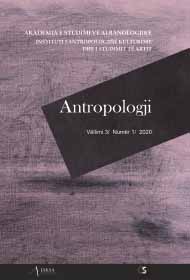
Keywords: socialism; urban song; administration; selection; actualization;
Albania’s state-socialist period constitutes one of the most intensive phases of change in the sphere of its traditional music, especially in traditional urban song. Its subjection to state administration and ideological criteria have not yet been properly researched, despite their obvious scholarly interest. This paper aims to take a step in this direction, relating to Shkodra’s urban song as a case study. Initially an outline of socialist policies concerning folklore and traditional music is made, deepening then specifically on its stance towards traditional urban song. Distinguishing three relatively distinct phases of this,an analysis of the actual cultural work with urban song is made, concentrating on the two constitutive processes of filtering or elaboration to which the tradition was subjected: selection and actualization. Being impossible to instrumentalize without perverting its style, the traditional repertoire was politically sanitized by stripping off its metaphysical dimension, purging “class enemies”, and “moderating” its emotionality. On the other hand, ubiquitous traditional motives like the flower, the nightingale or the spring were too convenient for the socialist idyll, preserving moreover the semblance of “folk” authenticity.
More...